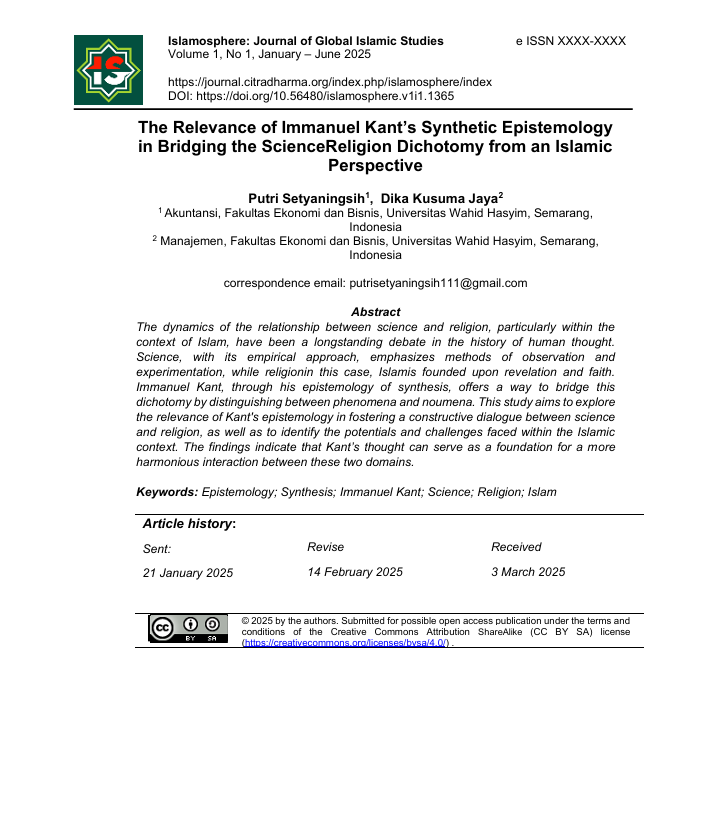The Relevance of Immanuel Kant’s Synthetic Epistemology in Bridging the Science Religion Dichotomy from an Islamic Perspective
 Abstract View:
Abstract View:
31
 PDF downloads:
PDF downloads:
19
Keywords:
Epistemology, Synthesis, Immanuel Kant, Religion, Science, IslamAbstract
The dynamics of the relationship between science and religion, particularly within the context of Islam, have been a longstanding debate in the history of human thought. Science, with its empirical approach, emphasizes methods of observation and experimentation, while religionin this case, Islamis founded upon revelation and faith. Immanuel Kant, through his epistemology of synthesis, offers a way to bridge this dichotomy by distinguishing between phenomena and noumena. This study aims to explore the relevance of Kant's epistemology in fostering a constructive dialogue between science and religion, as well as to identify the potentials and challenges faced within the Islamic context. The findings indicate that Kant’s thought can serve as a foundation for a more harmonious interaction between these two domains.
References
AlHabibi, M. L. J. (2023). Signifikasi Makna Kritisisme (Transendental) dalam Filsafat Imanuel Kant: Studi Kasus Filsafat Modern. Gunung Djati Conference Series, 24(3418), 375–391.
https://conferences.uinsgd.ac.id/
Basri, H. (2019). TEOLOGI SAINS: MENGATASI DIKOTOMI SAINSAGAMA PERSPEKIF ISLAM. Zawiyah, 5(2), 377–404.
https://ejournal.iainkendari.ac.id/index.php/zawiyah/article/viewFile/1506/1108
Dinata, S. (2021). Epistimologi Kritisisme Immanuel Kant. Kanz Philosophia A Journal for Islamic Philosophy and Mysticism, 7(2), 217–236. https://doi.org/10.20871/kpjipm.v7i2.183
Eldes, I. (2015). Ilmu Dan Hakekat Ilmu Pengetahuan Dalam Nilai Agama. AlHikmah, 9(2), 159–179.
https://doi.org/10.24260/alhikmah.v9i2.322
Farah Syafirna, Jihan Faeruzia Haris, Atika Najwa, & Muhammad Faqih Khamimi. (2023). Pemikiran Immanuel Kant tentang Kritisisme dan Implementasinya dalam Pendidikan Islam. Ta’wiluna: Jurnal Ilmu AlQur’an, Tafsir Dan Pemikiran Islam, 4(2), 238–248.
https://doi.org/10.58401/takwiluna.v4i2.1022
Haris, M. (2017). Agama dan Keberagamaan: Sebuah Klarifikasi untuk Empati. Tasamuh: Jurnal Studi Islam, 9(2), 523–544.
https://ejurnal.iainsorong.ac.id/index.php/Tasamuh/article/view/59/53
Immanuel Kant. (1990). THE CRITIQUE OF PURE REASON translated by J. M. D. Meiklejohn. Promotheus Books.
https://semantikon.com/philosophy/kantcritiquepurereason.pdf
Iryana, & Kawasati, R. (2020). Teknik Pengumpulan Data Metode Kualitatif. Ekonomi Syariah Sekolah Tinggi Agama Islam Negeri (STAIN) Sorong, 1(1). https://www.unhcr.org/publications/manuals/4d9352319/unhcrprotectiontrainingmanualeuropeanborderentryofficials2legal.html?query=excom 1989
Kosat, O. (2020). Agama Dan Budaya Dalam Filsafat. Lumen Veritatis: Jurnal Filsafat Dan Teologi, 10(2), 123–124.
https://doi.org/10.30822/lumenveritatis.v10i2.469
Miles, M. B., Huberman, A. M., & Saldana, J. (2015). Qualitative Data Analysis: A Methods Sourcebook (3rd ed.). Sage. https://ia803100.us.archive.org/0/items/spradleyanalisisdatakualitatifmodeletnografi/Matthew_Miles%2C_Michael_Hberman%2C_Johnny_SdanaQualitative_Data_Analysis__A_Methods_SourcebookSage_%282014%29%5B1%5D.pdf
Moch. Nurcholis. (2021). INTEGRASI ISLAM DAN SAINS: SEBUAH TELAAH EPISTEMOLOGI. 12, 6.
https://doi.org/10.36835/falasifa.v12i1.461
Mujib, A. (2019). Hakekat Ilmu Pengetahuan dalam Persfektif Islam. RI’AYAH, 11(1), 45–59.
Octaviana, D. R., & Ramadhani, R. A. (2021). HAKIKAT MANUSIA: Pengetahuan (Knowladge), Ilmu Pengetahuan (Sains), Filsafat Dan Agama Dila. Jurnal Tawadhu, 2(2), 143–159.
https://doi.org/10.52802/twd.v5i2.227
Rahman, A., Munandar, S. A., Fitriani, A., Karlina, Y., & Yumriani. (2022). Pengertian Pendidikan, Ilmu Pendidikan dan UnsurUnsur Pendidikan. Al Urwatul Wutsqa: Kajian Pendidikan Islam, 2(1), 1–8.
https://journal.unismuh.ac.id/index.php/alurwatul
Rofiq, M. N. (2018). Peranan Filsafat Ilmu Bagi Perkembangan Ilmu Pengetahuan. FALASIFA : Jurnal Studi Keislaman, 9(1), 161–175. https://doi.org/10.36835/falasifa.v9i1.112
Saputra, H. A. (2022). Epistemology Sintesisme EmpirisismeRasionalisme Immanuel Kant dan Implikasinya Bagi Ilmuilmu Sosial Keagamaan. Fikroh, 6(1), 50–57. http://jurnal.iaihnwpancor.ac.id/index.php/fikroh/article/view/705
Soelaiman, D. A. (2019). Filsafat Ilmu Pengetahuan Pespektif Barat dan Islam. Bandar Publishing
https://repository.bbg.ac.id/handle/778
Suaedi. (2016). Pengantar Filsafat ilmu. PT Penerbit IPB Press.
https://www.researchgate.net/publication/298787398_Pengantar_Filsafat_Ilmu
Sugiyono. (2016). Metode Penelitian Pendidikan (Pendekatan Kuantitatif, Kualitatif, dan R&D). Alfabeta cv.
Vera, S., & Hambali, R. Y. A. (2021). Aliran Rasionalisme dan Empirisme dalam Kerangka Ilmu Pengetahuan. Jurnal Penelitian Ilmu Ushuluddin, 1(2), 59–73. https://doi.org/10.15575/jpiu.12207

Downloads
Published
How to Cite
Issue
Section
License
Copyright (c) 2025 Putri Setyaningsih, Dika Kusuma Jaya

This work is licensed under a Creative Commons Attribution-ShareAlike 4.0 International License.
Copyright Notice
Authors who publish with this journal agree to the following terms:
- Authors retain copyright and grant the journal right of first publication with the work simultaneously licensed under a Creative Commons Attribution-ShareAlike 4.0 International License that allows others to share the work with an acknowledgment of the work's authorship and initial publication in this journal.
- Authors are able to enter into separate, additional contractual arrangements for the non-exclusive distribution of the journal's published version of the work (e.g., post it to an institutional repository or publish it in a book), with an acknowledgment of its initial publication in this journal.
- Authors are permitted and encouraged to post their work online (e.g., in institutional repositories or on their website) prior to and during the submission process, as it can lead to productive exchanges, as well as earlier and greater citation of published work (See The Effect of Open Access).

This work is licensed under a Creative Commons Attribution-ShareAlike 4.0 International License.




